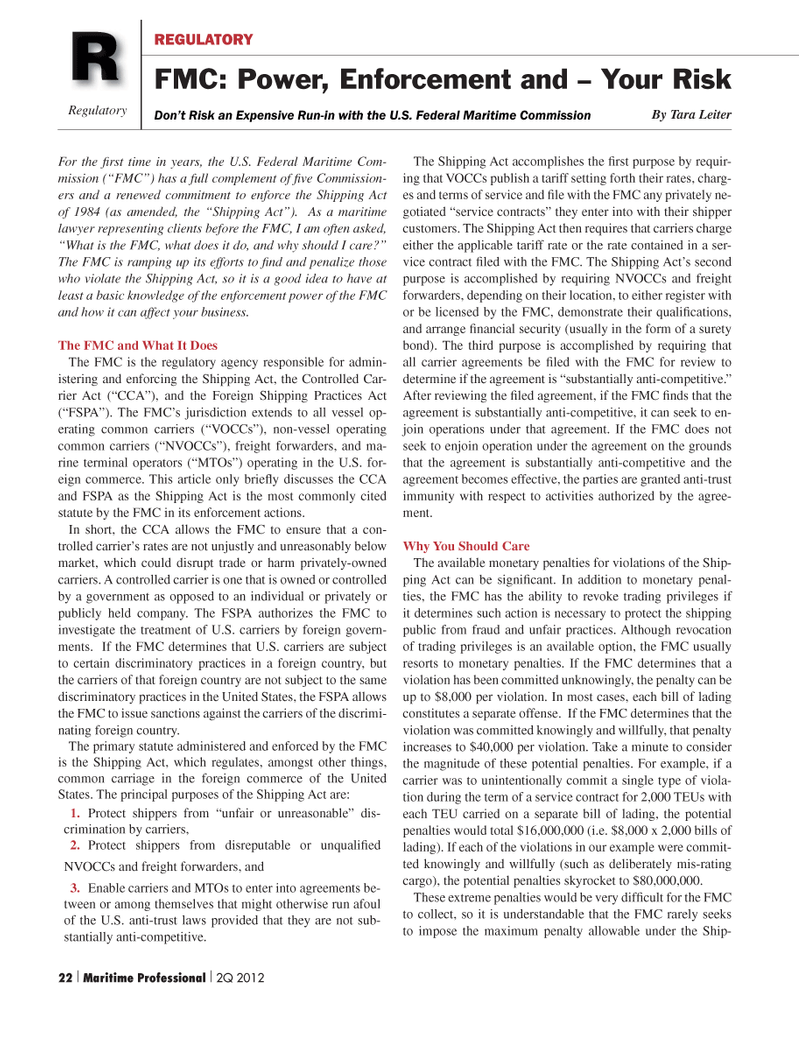
Page 22: of Maritime Logistics Professional Magazine (Q2 2012)
Maritime Risk
Read this page in Pdf, Flash or Html5 edition of Q2 2012 Maritime Logistics Professional Magazine
Regulatory
REGULATORY
FMC: Power, Enforcement and – Your Risk
Don’t Risk an Expensive Run-in with the U.S. Federal Maritime Commission
R
By Tara Leiter
For the fi rst time in years, the U.S. Federal Maritime Com- mission (“FMC”) has a full complement of fi ve Commission- ers and a renewed commitment to enforce the Shipping Act of 1984 (as amended, the “Shipping Act”). As a maritime lawyer representing clients before the FMC, I am often asked, “What is the FMC, what does it do, and why should I care?”
The FMC is ramping up its efforts to fi nd and penalize those who violate the Shipping Act, so it is a good idea to have at least a basic knowledge of the enforcement power of the FMC and how it can affect your business.
The FMC and What It Does
The FMC is the regulatory agency responsible for admin- istering and enforcing the Shipping Act, the Controlled Car- rier Act (“CCA”), and the Foreign Shipping Practices Act (“FSPA”). The FMC’s jurisdiction extends to all vessel op- erating common carriers (“VOCCs”), non-vessel operating common carriers (“NVOCCs”), freight forwarders, and ma- rine terminal operators (“MTOs”) operating in the U.S. for- eign commerce. This article only briefl y discusses the CCA and FSPA as the Shipping Act is the most commonly cited statute by the FMC in its enforcement actions.
In short, the CCA allows the FMC to ensure that a con- trolled carrier’s rates are not unjustly and unreasonably below market, which could disrupt trade or harm privately-owned carriers. A controlled carrier is one that is owned or controlled by a government as opposed to an individual or privately or publicly held company. The FSPA authorizes the FMC to investigate the treatment of U.S. carriers by foreign govern- ments. If the FMC determines that U.S. carriers are subject to certain discriminatory practices in a foreign country, but the carriers of that foreign country are not subject to the same discriminatory practices in the United States, the FSPA allows the FMC to issue sanctions against the carriers of the discrimi- nating foreign country.
The primary statute administered and enforced by the FMC is the Shipping Act, which regulates, amongst other things, common carriage in the foreign commerce of the United
States. The principal purposes of the Shipping Act are: 1. Protect shippers from “unfair or unreasonable” dis- crimination by carriers, 2. Protect shippers from disreputable or unqualifi ed
NVOCCs and freight forwarders, and 3. Enable carriers and MTOs to enter into agreements be- tween or among themselves that might otherwise run afoul of the U.S. anti-trust laws provided that they are not sub- stantially anti-competitive.
The Shipping Act accomplishes the fi rst purpose by requir- ing that VOCCs publish a tariff setting forth their rates, charg- es and terms of service and fi le with the FMC any privately ne- gotiated “service contracts” they enter into with their shipper customers. The Shipping Act then requires that carriers charge either the applicable tariff rate or the rate contained in a ser- vice contract fi led with the FMC. The Shipping Act’s second purpose is accomplished by requiring NVOCCs and freight forwarders, depending on their location, to either register with or be licensed by the FMC, demonstrate their qualifi cations, and arrange fi nancial security (usually in the form of a surety bond). The third purpose is accomplished by requiring that all carrier agreements be fi led with the FMC for review to determine if the agreement is “substantially anti-competitive.”
After reviewing the fi led agreement, if the FMC fi nds that the agreement is substantially anti-competitive, it can seek to en- join operations under that agreement. If the FMC does not seek to enjoin operation under the agreement on the grounds that the agreement is substantially anti-competitive and the agreement becomes effective, the parties are granted anti-trust immunity with respect to activities authorized by the agree- ment.
Why You Should Care
The available monetary penalties for violations of the Ship- ping Act can be signifi cant. In addition to monetary penal- ties, the FMC has the ability to revoke trading privileges if it determines such action is necessary to protect the shipping public from fraud and unfair practices. Although revocation of trading privileges is an available option, the FMC usually resorts to monetary penalties. If the FMC determines that a violation has been committed unknowingly, the penalty can be up to $8,000 per violation. In most cases, each bill of lading constitutes a separate offense. If the FMC determines that the violation was committed knowingly and willfully, that penalty increases to $40,000 per violation. Take a minute to consider the magnitude of these potential penalties. For example, if a carrier was to unintentionally commit a single type of viola- tion during the term of a service contract for 2,000 TEUs with each TEU carried on a separate bill of lading, the potential penalties would total $16,000,000 (i.e. $8,000 x 2,000 bills of lading). If each of the violations in our example were commit- ted knowingly and willfully (such as deliberately mis-rating cargo), the potential penalties skyrocket to $80,000,000.
These extreme penalties would be very diffi cult for the FMC to collect, so it is understandable that the FMC rarely seeks to impose the maximum penalty allowable under the Ship- 22 | Maritime Professional | 2Q 2012
MP #2 18-33 NEW STYLES.indd 22 5/4/2012 5:02:03 PM

 21
21

 23
23
